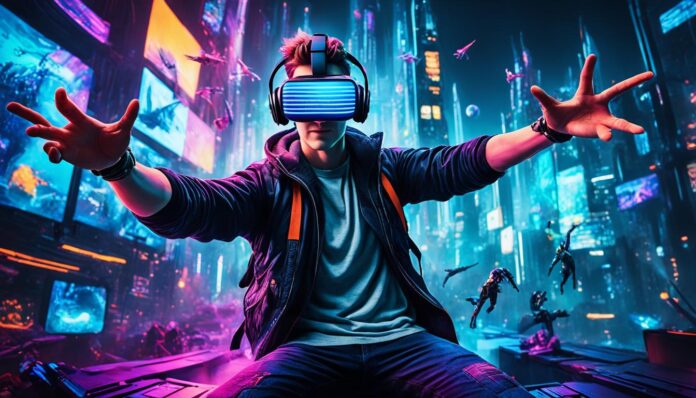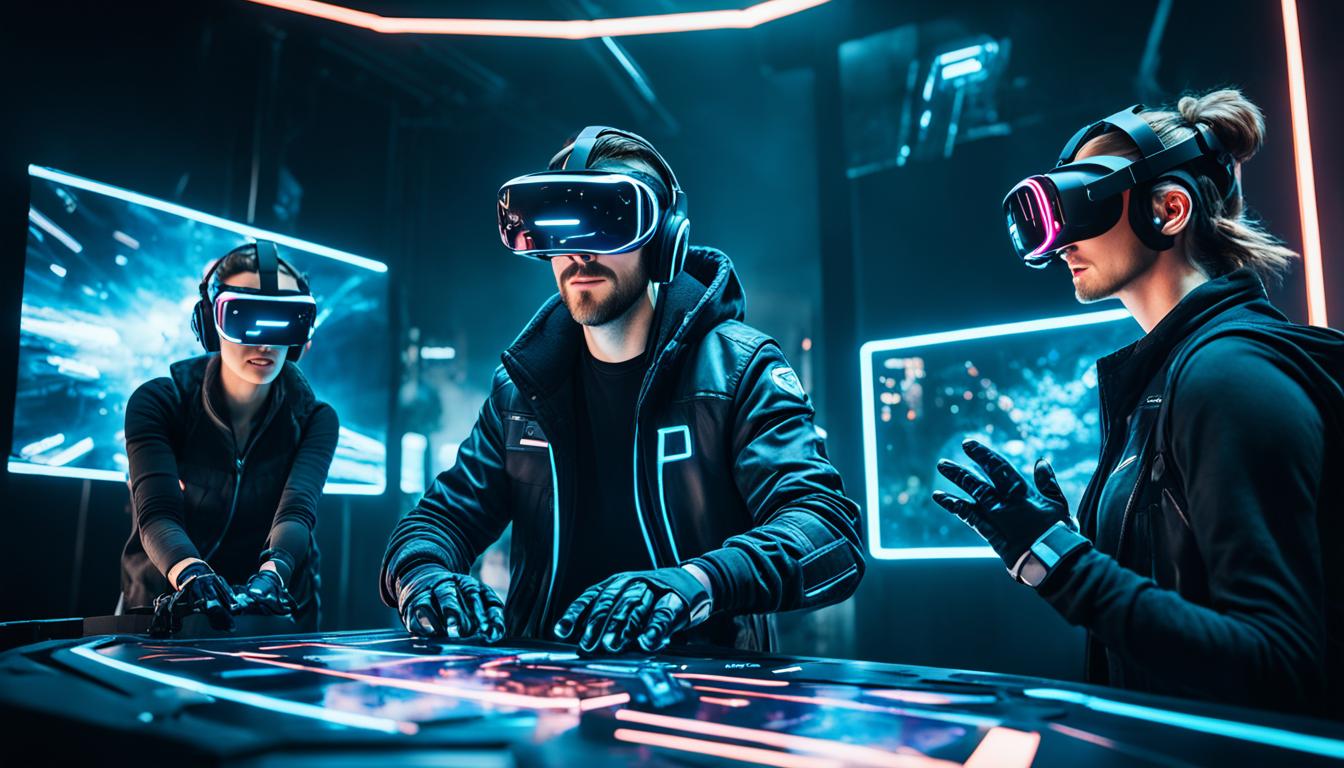
Immersive experiences, powered by the rapid evolution of virtual reality (VR) technology, are poised to transform the entertainment industry in the years ahead. As we look towards 2025, the advancements in VR are set to redefine how you engage with digital content, interact with virtual worlds, and enjoy captivating gaming and entertainment experiences.
This article will delve into the cutting-edge developments in VR technology, the influential role of the Meta Quest, and the exciting future of VR gaming and entertainment. We’ll also explore the diverse applications of VR across various industries, the potential challenges and limitations, and the emerging use of VR as a tool for education and training. Prepare to embark on a journey that will showcase the remarkable impact of VR on the entertainment landscape by 2025.
Key Takeaways
- Virtual reality technology is rapidly evolving, poised to transform the entertainment industry by 2025.
- The Meta Quest has played a significant role in enhancing immersive VR experiences.
- The future of VR gaming and entertainment promises even more realistic graphics, improved haptic feedback, and captivating interactive experiences.
- VR has the potential to be widely adopted in various industries, from education to healthcare.
- Addressing challenges and limitations, such as high prices and usability issues, will be crucial for widespread VR adoption.
The Rise of Immersive Experiences
The advancements in virtual reality (VR) technology have revolutionized the way we experience digital content. VR headsets, such as the Meta Quest, have played a significant role in enhancing the immersive experience. These advanced headsets offer 360-degree views, high-resolution displays, and powerful processors, enabling users to dive into virtual worlds with unparalleled realism.
Advancements in VR Technology
The continuous improvement in optics, screens, and processors is driving the evolution of VR technology, pushing the boundaries of what VR can achieve. From enhanced visual fidelity to improved haptic feedback, VR is becoming increasingly lifelike, providing users with a level of immersion that was once relegated to science fiction. As these advancements continue, the gaming industry, entertainment sector, and various other industries are poised to witness a fundamental shift in the way we interact with digital content.
Impact of Meta Quest on VR
The Meta Quest, formerly known as the Oculus Quest, has emerged as a game-changer in the VR landscape. With its intuitive controls, wireless design, and user-friendly interface, the Meta Quest has made VR technology more accessible to mainstream audiences. The device’s ability to seamlessly blend the virtual and physical worlds has fueled the growth of interactive storytelling, 360-degree video experiences, and social VR platforms, revolutionizing the way we engage with entertainment and each other in the digital realm.
How will advancements in virtual reality impact entertainment by 2025?
The future of VR gaming and entertainment is incredibly promising. VR has already made significant inroads in the gaming industry, providing immersive and captivating experiences. With the continuous advancement of VR technology, you can anticipate even more realistic graphics, improved haptic feedback, and enhanced interactive experiences. The rise of metaverses, interactive virtual reality environments, is set to transform the way you socialize, work, and play in the digital realm.
The Future of VR Gaming and Entertainment
VR gaming has already revolutionized the industry, offering players a level of immersion and engagement that was once unimaginable. As VR technology continues to evolve, you can expect to see even more realistic graphics, advanced motion tracking, and innovative gameplay mechanics. The integration of haptic feedback, which allows users to physically feel the virtual world, will further enhance the sense of presence and realism. Additionally, the development of social VR platforms will enable you to connect with friends and fellow enthusiasts in shared virtual spaces, creating a new era of online socializing and entertainment.
Applications of VR in Various Industries
The impact of VR technology extends far beyond the gaming industry. Across various sectors, VR is being leveraged to revolutionize the way you experience and interact with digital content. In the entertainment industry, VR is transforming the way you consume movies, TV shows, and live events, allowing you to immerse yourself in 360-degree video experiences. In the healthcare sector, VR is being used for medical training, pain management, and even therapeutic treatments. In the education realm, VR is enhancing learning experiences by providing interactive, hands-on simulations and virtual field trips. The versatility of VR technology is poised to reshape numerous industries, redefining the way you engage with information, entertainment, and the world around you.

Overcoming Challenges and Limitations
While the future of
virtual reality
(VR) in the
entertainment
industry holds immense promise, there are several challenges and limitations that need to be addressed. One of the primary obstacles is the high prices of VR headsets and related hardware, which can limit their accessibility to a wider audience. Additionally, the
gaming industry
and other sectors have experienced a lack of viable business models and limited competition, hindering the widespread adoption of VR technology.
Potential Challenges and Limitations of VR
Another challenge lies in the comfort and usability of VR headsets. Extended use of these devices can cause discomfort and fatigue, as the weight and design of the headsets can be cumbersome. Additionally, the display quality of VR headsets is still not on par with traditional monitors, making them less suitable for detailed work or tasks requiring high-resolution visuals.
VR as a Tool for Education and Training
Despite these challenges, VR has emerged as a powerful tool for education and training. Its ability to create immersive, 360-degree video experiences and interactive virtual environments has made it a valuable asset in fields such as medical training, engineering, and military simulation. By providing users with the ability to engage with content in a more intuitive and engaging manner, VR has the potential to revolutionize the way we learn and acquire new skills.
| Potential Challenges of VR | Advantages of VR in Education and Training |
|---|---|
| High prices of VR headsets and hardware | Immersive, 360-degree experiences |
| Limited competition and viable business models | Interactive virtual environments |
| Comfort and usability issues with VR headsets | Enhanced engagement and skills acquisition |
| Display quality not on par with traditional monitors | Applicable in diverse fields like medicine, engineering, and military |
Conclusion
As the advancements in virtual reality technology continue to unfold, the entertainment industry is poised for a transformative shift by 2025. The rise of immersive experiences, fueled by the continuous evolution of VR hardware and software, will enable you to fully immerse yourself in captivating virtual worlds, engage in captivating gaming experiences, and interact with digital content in innovative ways.
While challenges and limitations still exist, the potential of VR to transform various industries, from education to healthcare, is undeniable. As the technology matures and becomes more accessible, you can expect to see a future where virtual and physical realities seamlessly merge, redefining the way you experience entertainment and interact with the digital world.
The future of VR in entertainment is filled with endless possibilities, and 2025 will undoubtedly be a pivotal year in this transformative journey. From enhanced realism and interactivity to the rise of metaverses, the entertainment landscape is about to undergo a profound shift that will forever change the way you engage with digital content and immerse yourself in virtual experiences.
FAQ
What advancements in virtual reality technology are driving the future of entertainment?
The rapid evolution of VR technology, including improvements in optics, screens, and processors, is enabling more realistic and immersive digital experiences. VR headsets, such as the Meta Quest, are offering 360-degree views, high-resolution displays, and powerful processing capabilities, allowing users to fully dive into virtual worlds.
How is the Meta Quest impacting the VR industry?
The Meta Quest has played a significant role in enhancing the immersive VR experience. With features like 360-degree views, high-resolution displays, and powerful processors, the Meta Quest is driving the evolution of VR technology and pushing the boundaries of what can be achieved in virtual reality.
What is the future of VR gaming and entertainment?
The future of VR gaming and entertainment is incredibly promising. VR has already made significant inroads in the gaming industry, providing immersive and captivating experiences. With the continuous advancement of VR technology, we can anticipate even more realistic graphics, improved haptic feedback, and enhanced interactive experiences. The rise of metaverses, interactive virtual reality environments, is set to transform the way we socialize, work, and play in the digital realm.
What are the potential challenges and limitations of VR technology?
While the future of VR is promising, there are challenges and limitations that need to be addressed. High prices, limited competition, and lack of viable business models pose obstacles to widespread adoption. The comfort and usability of VR headsets is also a challenge, as extended use can cause discomfort and fatigue. Additionally, the display quality of VR headsets is still not on par with traditional monitors, making them less suitable for detailed work.
How can VR be used as a tool for education and training?
VR technology has the potential to revolutionize education and training. By creating immersive and interactive learning environments, VR can enhance the learning experience, making it more engaging and effective. VR can be used to simulate real-world scenarios, allowing for hands-on training and experimentation in a safe and controlled setting.
